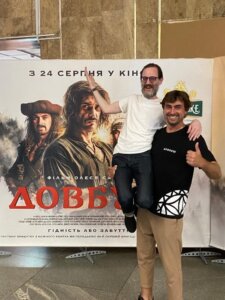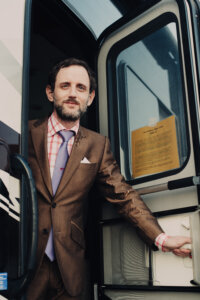In a blockbuster film about the Ukrainian Robin Hood, the Baal Shem Tov makes his debut
Actor Luzer Twersky portrays the founder of Hasidic Judaism in the movie ‘Dovbush’

Courtesy of Luzer Twersky
As improbable as it sounds, the Baal Shem Tov has made his screen debut as a character in a new costume drama set in 18th-century Ukraine. Rabbi Israel Ben Eliezer, the founder of Hasidic Judaism, appears in the movie Dovbush aiding Oleksa Dovbush, a sort of Ukrainian Robin Hood who battled the Polish nobility from his base in the Carpathian Mountains.
The film was shot in Ukraine in the summer of 2021 and is replete with battle scenes filmed before the battle with Russia began. It was released there in August, much to the delight of Ukrainian soldiers at the Russian front. And in case you were thinking things couldn’t get any stranger, the Baal Shem Tov is played by an American actor named Luzer Twersky, a former Hasid who lives in an RV in Los Angeles. Twersky himself happens to be a descendant of the Baal Shem Tov, or the Besht as he’s known by his acronym.
For his audition, Twersky, 38, recorded himself singing a nigun, a wordless melody, of the Baal Shem Tov in his RV. He knew the nigun from his days as a Hasid. If actors auditioning for the role asked what a nigun was, Twersky said, they were out of the running.
“I think that the love I have for your country is nothing compared to the love you have for your country,” Twersky told a packed movie theater in Bay Ridge, Brooklyn, where a screening for Ukrainian ex-pats was held last month.
“Slavo Ukrainia,” Twersky declared. Glory to Ukraine.
He posed for photos with a couple of audience members, including Khrystyna Khudchak, who came to the U.S. from Ukraine eight years ago and whose father is currently fighting in the war. She spent last summer in Ukraine and saw the film twice there, first with a friend and then with her mother and brother.
“This story is very close to me because my mom told me the story of Oleksa Dovbush,” said Khudchak. “This movie shows the braveness of those people. It gave me goosebumps.”
Daniel Bilak, a Canadian lawyer of Ukrainian descent, served as co-producer of the film. He said the director, Oles Sanin, wanted to release the film in May 2022 but after the Russian invasion, decided to wait until Aug. 24, Ukrainian Independence Day.
According to a publicist Dovbush is now the third highest grossing film in Ukrainian history and is poised to surpass the second highest grossing motion picture, Me. You. He. She., a comedy starring a comedian named Volodymyr Zelenskyy.
Twersky went to Kyiv for the film’s premiere in August and extended his stay for five weeks, accompanying the film’s production team at screenings in a military hospital in Kyiv and in Zaporizhzhia, a dozen miles from the front.
“It smells like war,” Twersky said of Zaporizhzhia, where he encountered a soldier about his size (5’7” 120 lbs.) who still had dried blood on his body.
“He had fresh wounds,” Twersky said. “He was still dirty from the war. He had a makeshift sling around his arm. He looked like he came directly from the front line, went to the field hospital, got patched up and came to the movie. And that tells you everything you need to know about what this film means for the people and for the country. It tells you everything you need to know about what kind of country Ukraine is.”
Three Scenes with the Besht
As the Besht, Twersky gets less than five minutes of screen time in the nearly two-hour film — he appears in three scenes. In the first, he encounters Dovbush who is in chains and assures the Besht, who had been submerging himself in a stream that served as a mikveh, that he’s not a thief.

“Who could ever think that?” replies the Besht .
Dovbush asks the Besht if he is alone.
“One is never alone,” the Besht replies. “But other than me, there is no one else here.”
Dovbush asks for directions and the Besht warns that calamity awaits Dovbush on one particular road, and advises the fugitive to take to the mountains: “That’s where your destiny calls you. That’s where you’ll lose your chains.”
In the second scene, the Besht pulls an unconscious Dovbush from the river and recites a prayer of healing over the unconscious outlaw. The Besht suggests that Dovbush abandon his quest to avenge his oppressed compatriots. “There is no justice without mercy,” he declares.
Dovbush presents his pipe to the Besht as a gift. “This land is your land, too. I won’t forget that,” he says.
At the end of the film, when Polish officials display a corpse they wrongly assume to be that of Dovbush, the Besht is visible in the crowd of onlookers, smoking the pipe Dovbush gave him.
The Ukrainian Robin Hood
Few reliable historical sources exist on the relationship between Dovbush and the Bal Shem Tov. Most of what we know comes from a combination of Ukrainian and Jewish legends in the form of short stories, poems, plays, novels and ballads.

Larisa Fialkova, a professor of Hebrew and Comparative Literature at the University of Haifa, who wrote a 2011 academic paper titled Oleksa Dovbush: An Alternative Biography of the Ukrainian Hero Based on Jewish Sources, said that there are about 20 or 30 legends about Dovbush and the Besht.
One includes a Jewish innkeeper who is said to have given Dovbush his nickname after observing that the infant was hairy like a bear. (The Hebrew word for bear is dov.) Legend has it that the innkeeper also provided Dovbush’s widowed mother with financial assistance. Some of the lore claims that when Dovbush saw a poor Jew, he gave them money for the Sabbath, lending credence to his Robin Hood rep. But Dovbush was also known for robbing rich Jews — anyone who was rich, actually.
One legend mentions an unsuccessful attempt by Dovbush and his compatriots to lead the Baal Shem Tov to the Land of Israel through caves and tunnels.
“He tried to go to the land of Israel with them but then he saw some sign from God which made him understand that the time for the journey didn’t come yet,” Fialkova said of the legend.
The immortal Dovbush
Twersky told me he has many relatives buried in Ukraine and, when he went there this summer, he visited the graves of his great, great, great grandparents in Kyiv to pray for his father’s recovery from surgery “because it felt better than doing nothing and I knew it would make my mom very happy.”
The film’s co-producer Bilak spent five days with Twersky driving 1,200 miles around Ukraine at film screenings.
“I got the best education on the Hasidim that any goy could possibly dream of,” he said.

Asked what he thought the Dovbush film might do for the war effort, Bilak replied: “People needed a movie that made them feel good about what they’re doing. And that is fighting for our very existence. If the Russians stop fighting, they go home. If we stop fighting, they’re going to exterminate us.”
According to the legends, the body of Oleksa Dovbush was hacked up into a dozen pieces and hung along the roads as a cautionary tale. The man, so it is said, could only be killed with pure silver bullets that had been sanctified by a priest, and only after the assassin fasted and prayed for three days.
On the silver screen, though, Dovbush does not die. And he certainly lives on with the 68th Separate Jaeger Brigade in Ukraine which is also known as the Oleksa Dovbush Brigade. Formed at the start of the war with Russia, the brigade specializes in combat in forest and swamps, which is fitting given that Dovbush and his men were known as “the boys of the forest.” The Dovbush Brigade was one of the first military units to see the film. Its logo is a bear carrying a long axe like the one Dovbush used in battle.
According to Fialkova, another tale has it that Dovbush never died but instead entered a cave where he’s been sleeping and waiting for the right time to wake up.
“One day when he will be needed, he will get up, walk out of the cave, take his axe and continue his struggle for Ukraine,” Fialkova said. “So, this is a time when it would be very good if he can wake up and go out of the cave and help the fighters.”
A message from our Publisher & CEO Rachel Fishman Feddersen

I hope you appreciated this article. Before you go, I’d like to ask you to please support the Forward’s award-winning, nonprofit journalism so that we can be prepared for whatever news 2025 brings.
At a time when other newsrooms are closing or cutting back, the Forward has removed its paywall and invested additional resources to report on the ground from Israel and around the U.S. on the impact of the war, rising antisemitism and polarized discourse.
Readers like you make it all possible. Support our work by becoming a Forward Member and connect with our journalism and your community.
— Rachel Fishman Feddersen, Publisher and CEO






















